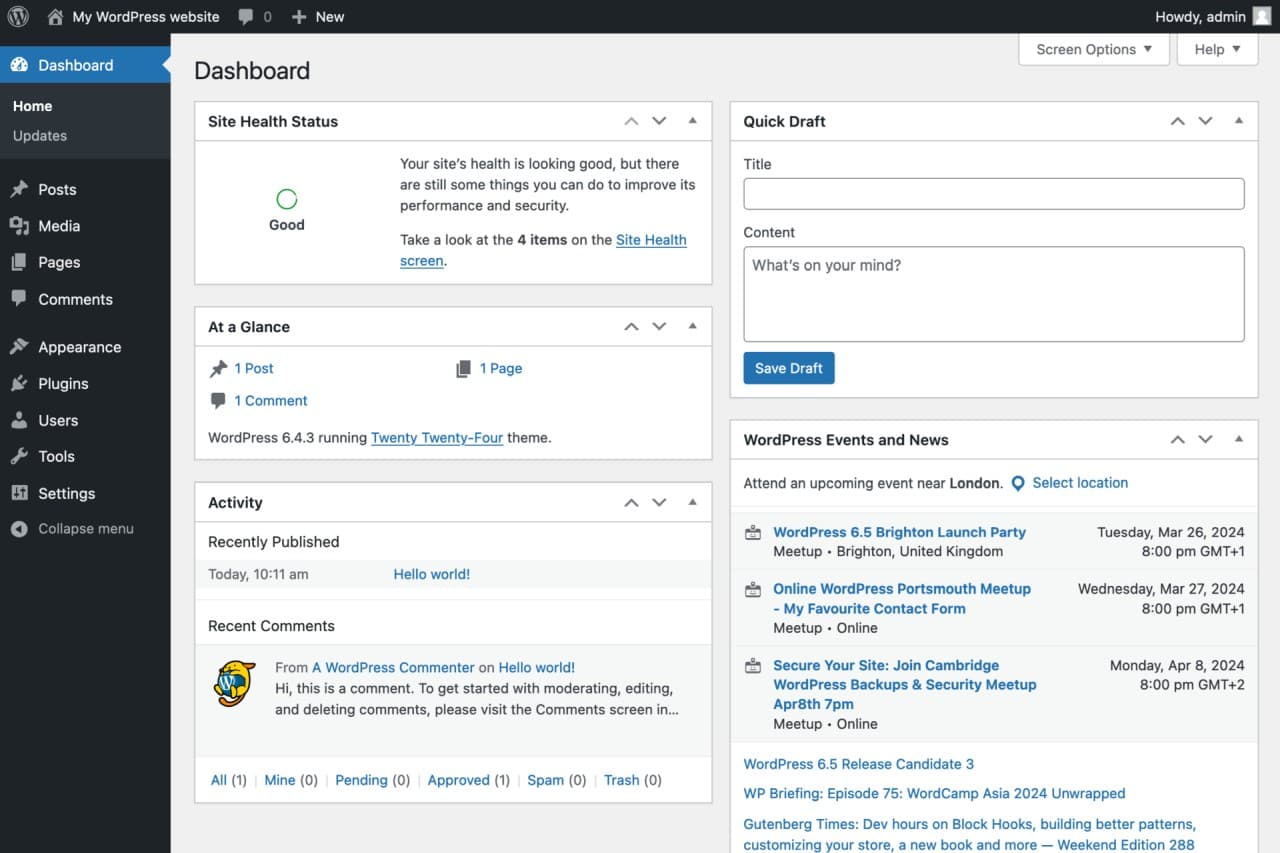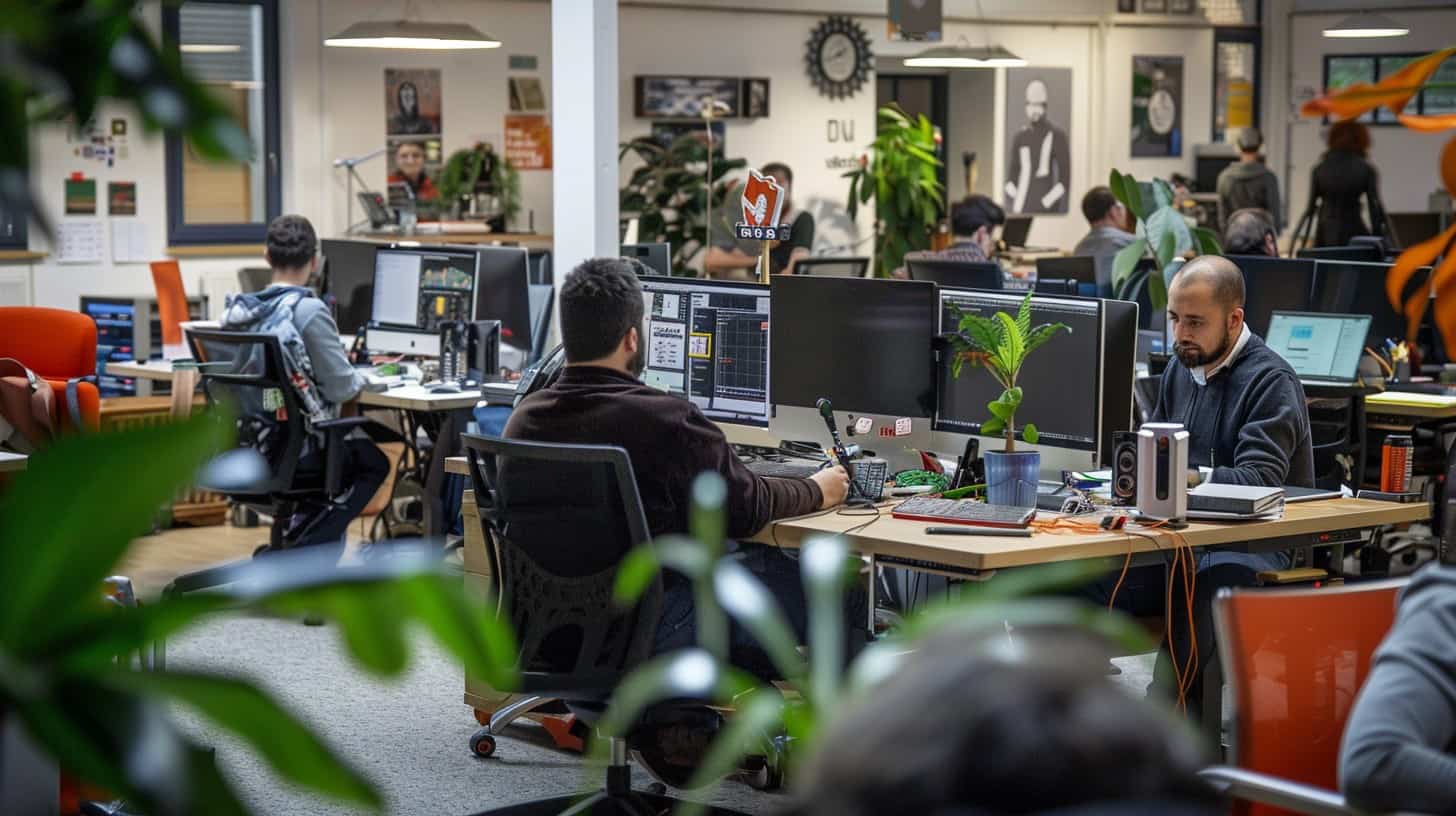Heard rumors that WordPress is on its way out? Think again. This powerhouse drives over 43% of the digital landscape, leaving rivals in the dust. We’re here to guide you through what’s really happening with your favorite site builder and hint at its future.
Don’t miss out…
Key Takeaways
WordPress started in 2003 by Matt Mullenweg and Mike Little, growing from a simple blogging tool to a huge platform powering 43.1% of websites.
Challenges include security issues and competition, but its large community, flexibility, and big business trust keep it strong.
New trends like AI and no-code development are reshaping WordPress, making it more user-friendly for everyone without coding skills.
Table of Contents
A Brief History of WordPress

Jumping straight into the heart of our blog, let’s explore how WordPress began its journey. Back in 2003, two forward-thinking individuals, Matt Mullenweg and Mike Little, decided to build a new kind of blogging tool.
They wanted something simple yet powerful enough to change the digital storytelling landscape. Voilà! WordPress was born—starting as a basic platform for bloggers.
Over time, this humble beginning morphed into something colossal. By embracing open-source principles, WordPress evolved rapidly. Its toolbox grew from mere blogging features to an extensive array of customization options that catered not only to personal websites but also to bigger fish in the pond like eCommerce shops through WooCommerce integration after Automattic brought it under its wing in 2017.
This transformation didn’t happen overnight but showed the world what community-driven development could achieve. Imagine going from tweaking basic HTML on your site to having complete control over design and functionality without writing a single line of code—the dream for every web designer out there! Plus, with WordPress hosting becoming more accessible and user-friendly, getting your site up and running has never been easier or more affordable.
The Current Status of WordPress
Right now, WordPress rules as the boss of content management software. It’s in charge of more websites than any other system out there.
Market Share of WordPress
WordPress is the big cheese of the CMS world. Let’s lay down the numbers in a table, shall we? Here’s how it stacks up against the rest.
| CMS Platform | Market Share |
|---|---|
| WordPress | 43.1% |
| Next Closest Competitor | Significantly less |
So, what does this table tell us? For starters, WordPress isn’t just participating in the race. It’s leading it by a mile. Imagine 43.1% of websites waving the WordPress banner. That’s almost half the internet!
And the “Next Closest Competitor”? They’re eating WordPress’ dust. No one comes close. This gap is not just big; it’s a chasm.
Now, why is this important? Well, in a world where everyone’s fighting for your attention, WordPress holds a chunk of the territory. It’s like owning the biggest piece of the digital pie. With over 28% of the top websites choosing WordPress, it’s clear. This platform is not just surviving; it’s thriving.
But here’s the kicker. While these numbers are impressive, it’s not just about being number one. It’s what being number one means. People trust WordPress. Big names, small names, and everyone in between. It’s the go-to, the reliable friend in the digital age.
So, is WordPress dying? Far from it. With a market share like this, it’s more alive than ever. Just chew on that for a moment.
Statistics of WordPress Use
So, you’re curious about how WordPress is doing these days? Let’s dive into the numbers without any fluff. Here’s the deal, laid out in a straightforward HTML table because, well, we geeks love data in its purest form.
| Statistic | Number |
|---|---|
| Websites Powered by WordPress | 43.1% |
| Daily Hacked WordPress Sites | 13,000 |
| Outdated WordPress Sites (Hacked) | 49.8% |
| Websites in Top 1 Million | 28% |
Let’s break it down a bit…
- A whopping 43.1% of websites out there are buddies with WordPress. That’s almost every second site you visit. Imagine that!
- Every day, 13,000 WordPress sites find themselves in a bit of a pickle, getting hacked. Wear your helmets, folks.
- Nearly half of the hacked sites are kind of asking for it, being outdated and all. Keep things up to date, people—it’s not rocket science!
- Lastly, 28% of the top dogs, I mean, the top one million websites, trust WordPress. If that doesn’t scream “leader,” I don’t know what does.
So, there you have it. The numbers don’t lie. WordPress isn’t just hanging in there; it’s thriving, despite a few bumps along the way. Remember, folks, keep those updates coming and maybe, just maybe, we won’t be part of that 13,000 daily statistic.
Challenges Facing WordPress
WordPress faces quite the storm. It’s not just a tight race with Shopify and Squarespace, but security woes have users biting their nails too.
Security Issues
Popularity comes with a price, and for WordPress, that price is being a big red target for hackers. With more hacking attempts aimed at it than other platforms, keeping a WordPress site safe is like guarding a fort.
You need good walls—updated software—and careful choices about who gets in—picking reliable themes and plugins from well-known sources.
Simple steps can make a big difference in security. Always keep things fresh with the latest updates and patches. Think of it as locking your doors at night; you wouldn’t skip it because it’s just smart safety advice.
Plus, using products from trusted companies adds another layer of protection—as if you’re adding surveillance cameras to your setup.
The Controversy Surrounding Gutenberg
Gutenberg shook things up, and not everyone was cheering. This new editor brought a block system to WordPress, aiming for simplicity and efficiency in creating posts. But here’s the kicker—many users found it anything but simple.
They missed the old ways and felt lost in a sea of blocks that didn’t play nice with their advanced design needs.
This wasn’t just about resistance to change or nostalgia for the “good old days.” Real challenges emerged as folks grappled with Gutenberg’s learning curve. Blogs buzzed with debates, forums filled with feedback, some shouting praise, others venting frustration.
It became clear: this move had split the camp right down the middle.
Competition from New Platforms like Shopify and Squarespace
Shopify and Squarespace are stepping up the game, attracting folks who want slick websites without much fuss. These platforms are like a fresh breeze for people tired of wrestling with code.
They offer pretty templates and straightforward tools to get an online store or portfolio up in no time.
Webflow joins this trendy club too, giving more creative freedom. It’s like having a paintbrush that also knows how to code—ideal for those wanting their sites to stand out without learning programming.
Unlike Wix, which puts you in a bit of a box with its ready-made elements, Webflow lets your imagination run wild. This new kid on the block is making waves by blending design freedom with ease of use—a combo hard to resist for modern web creators.
Factors Supporting WordPress’ Longevity

The secret sauce to WordPress sticking around? It’s like a chameleon, always adapting. From its huge support group to being able to handle anything from small blogs to giant websites, it just keeps rolling with the punches.
Curious how this all plays out? Stay tuned for more on what keeps WordPress at the top of its game!
A Large and Active Community
WordPress gathers folks from all corners—coders, artists, and everyday users. They share a common space, helping each other out. Picture a beehive, buzzing with activity; that’s the WordPress society for you.
This vibrant group doesn’t just sit back; they roll up their sleeves—fixing bugs, designing new themes, and adding functionalities. It’s like a never-ending potluck where everyone brings something to the table.
This crowd isn’t just big; it’s dedicated, too. They organize meetups and conferences called WordCamps worldwide. Imagine geeks chatting over coffee or debating the best plugin—it happens here! And when someone needs help? Boom—a solution pops up in forums faster than you can say “WordPress.” This ecosystem of user-made tools means there’s always something fresh on your dashboard.
From solving security puzzles to jazzing up webpages with Elementor or Yoast SEO tricks—the community ensures WordPress stays on its toes.
Versatility and Flexibility
You can twist and turn WordPress like a Rubik’s Cube until it fits your vision perfectly. From simple blogs to complex e-commerce platforms, flexibility is its middle name. Want an online store? WooCommerce has got you covered.
Dreaming of teaching a course? Look into WordPress Learning Management Systems (LMS). It’s like having your cake and eating it too—because why settle for less?
Think about this: whatever wild web idea pops into your head at 2 AM, WordPress probably has a plugin or theme that says, “Let’s make it happen.” And if somehow it doesn’t, there’s a whole army of developers ready to create something new just for you.
That adaptability keeps everyone from small bloggers to big businesses coming back for more. It’s not magic; it’s knowing how to play the game with the right tools—and winning at it feels pretty good!
Trust from Large Businesses and Organizations
Big companies and well-known groups trust WordPress a lot. They like how stable and safe it is. They also enjoy being able to change things up however they want. This makes WordPress stand out in the crowd.
The people leading WordPress have big plans for its future. They’re focusing on the Gutenberg tool and blocks. This will make website making super easy, even if you don’t know coding.
It’s like building with LEGO bricks – each piece fits just right to create something awesome!
Impact of Artificial Intelligence on WordPress
Artificial intelligence is shaking things up for WordPress, big time. Picture AI tools like GPT-3 stepping into the ring. They’re not just contenders; they’re heavyweights capable of transforming how we create and manage content.
Imagine whipping up a blog post as easy as pie, or a web page that pretty much builds itself. AI is turning these dreams into reality for many users and developers in the WordPress ecosystem.
Now, let’s add chatbots to the mix—they’re like your website’s new best friends. Chatbots can talk to visitors round the clock, handle basic tasks, and even crack a joke here and there—making websites more interactive without breaking a sweat.
With AI-powered advancements, WordPress sites are becoming smarter by the day. The catch? We all need to keep up, learn new tricks, and maybe rethink how we’ve been doing things till now.
Welcome to an exciting era where artificial intelligence meets web development head-on in the world of open-source projects like WordPress!
The Future of WordPress: Predictions and Possibilities

The future of WordPress looks like a sky full of stars—bright and full of potential. Imagine it becoming more user-friendly, thanks to AI tools that can guess what you’re trying to do and help you get there faster.
Big organizations love WordPress for how stable and safe it is, and this isn’t going to change. What’s exciting is the talk about making teamwork smoother with real-time cooperation features.
This means web designers could work on a site together at the same time, like in those spy movies where tech whizzes solve problems by typing furiously across from each other.
Now, let’s think about the community behind WordPress—the developers, bloggers, and creators who pour their hearts into making it better every day. They’re not just sitting back; they’re dreaming up ways to keep WordPress on top despite new competitors popping up left and right.
With plans to weave AI even deeper into troubleshooting and security updates, imagine having a digital sidekick making sure your site is always running smoothly without lifting a finger.
And as we move forward, peeking around the corner is the next big thing: how this robust community shapes WordPress’s role in eCommerce.
The Role of the WordPress Community

Shifting gears from what might happen to WordPress, let’s talk about the folks making things happen right now—the WordPress community. This lively bunch isn’t just a group of casual users.
They are developers, creators, and enthusiasts who breathe life into WordPress every day. They share tips, build plugins and themes, and offer support in forums. It’s like having a team of helpful neighbors online.
This community doesn’t sit back; they’re always on the move. Innovating, fixing bugs, and pushing out updates makes WordPress stay ahead. Ever stumbled upon a problem? Chances are someone from the community has not only faced it but solved it too—and they’ve probably shared how online.
It’s this spirit of give-and-take that keeps WordPress vibrant and growing stronger with each challenge thrown its way.
WordPress and eCommerce: Current Scenario and Future Prospects
WordPress is not just for blogging anymore. With WooCommerce, it’s become a powerhouse in the online store world. Imagine setting up a shop with just a few clicks. That’s what WordPress and WooCommerce offer.
They make starting an e-commerce site as easy as pie. Right now, many people use this combo to sell anything from handmade soap to cutting-edge tech gear.
The future looks bright for WordPress in the e-commerce space. More and more businesses want to open online stores without breaking the bank or coding night and day. WordPress offers them that golden ticket—ease of use combined with powerful features like SEO tools and content management systems (CMS).
Plus, its community keeps growing, making sure help is never far away if you hit a bump in the setup process.
Now let’s dive deeper into how competition affects WordPress’ stronghold on content creation and website building…
The Case Against WordPress: Arguments and Counterarguments

Some folks argue WordPress is a ship taking on water, what with all its security holes and outdated looks. But then, you’ve got the crew that’s patching up those leaks faster than you can say “update” and jazzing it up to hang with the cool kids like Shopify and Squarespace.
Security Concerns and Solutions
WordPress sites attract more hackers than a lamp does moths. It’s like a never-ending game of cat and mouse, where WordPress is the cheese everyone wants a bite of. Hackers are always lurking around the corner, trying to find new ways in.
But don’t fret; there are shields and armor to keep your castle safe. Updating everything regularly is like having guards at your gate—both for the core system and any add-ons you’ve installed from trusted sources.
On top of staying current, consider adding extra layers of protection. Picture this: Using Web Application Firewalls (WAF) is akin to building a moat around your fortress, while Secure Sockets Layer (SSL) certificates act as an invisible cloak, making it harder for villains to see you.
And hey, sometimes simple steps like using complex passwords can be as effective as hiding your treasure map—making it nearly impossible for pirates to find their way in.
Now that we’ve got security covered…
Comparing Usability between WordPress and Other Platforms
Let’s talk shop and simplify this digital jungle, shall we? We’re diving into the usability face-off between WordPress and other website builders. Cue the virtual drumroll…
| Features | WordPress | Other Platforms (Wix, Squarespace) |
|---|---|---|
| Ease of Use | Flexible, but with a steeper learning curve. | Drag-and-drop, friendly for beginners. |
| Customization | Sky’s the limit with plugins and themes. | Simpler, but some limits on deep dives. |
| SEO | Powerful, with plugins like Yoast SEO. | Built-in, but less tweakable. |
| Price | Free to start, pay for hosting and extras. | Monthly fee, straightforward. |
| Community Support | Massive, with forums and tutorials galore. | Present, but not as vast or deep. |
So, peeling away the digital onion layers, each platform shines in its own way. WordPress, like a Swiss Army knife, packs a punch for those willing to tinker. On the flip side, Wix and Squarespace serve up website creation with the ease of brewing morning coffee.
Now, let’s see how AI is shaking things up…
The Transition to No-code Web Development: Implications for WordPress
The shift to no-code web building platforms is making waves, and WordPress has to ride them or risk sinking. Tools like Webflow are drawing a crowd with their easy-to-use interfaces, allowing anyone to build websites without touching a line of code.
This trend is reshaping how we think about creating online spaces. No longer do you need to be a coding wizard to bring your digital dreams to life. Now, that power lies in the hands of many, not just the few.
For WordPress, this could mean rethinking its game plan. It’s always been known for its flexibility and open-source nature, but with the rise of no-code options, it might need some new tricks.
Web development used to be all about codes and commands – something out of reach for most people. But now? It’s as if everyone’s been given a magic wand – one they can wave without needing spells (or programming languages).
This changes everything for WordPress because it thrives on user-friendliness and community support. Suddenly, there’s competition that speaks directly to those wanting more simplicity in web design and deployment process—a challenge WordPress must respond to actively if it aims at staying ahead or even just relevant in this rapidly evolving field.
Moving into the future of WordPress in an age dominated by drag-and-drop site builders…
The Future of WordPress in the Age of No-code
As we shift gears from the world of coding to a more user-friendly era of no-code web development, WordPress is stepping up its game. No longer just for those who can write lines of code in their sleep, WordPress is embracing AI tools and simplifying the content management process.
This move makes it easier for everyone—from bloggers to business owners—to create and manage websites without needing to learn programming languages.
In this new age, WordPress isn’t just surviving; it’s poised to thrive. Thanks to its large community, flexibility, and trust from big companies, WordPress adapts quickly. It’s eyeing a future where collaboration and smooth user experiences are key.
With drag-and-drop builders and real-time collaboration features getting baked into the core experience, creating with WordPress feels like piecing together a puzzle – simple, fun, and satisfyingly creative.
So yes, in the age of no-code platforms bustling onto the scene, WordPress stands tall—not as an old guard left behind but as a versatile champion ready for what’s next.
A Look at WordPress Usage Statistics, Not Just Market Share
Leaving the no-code revolution in the rearview, let’s dive into the deep end with WordPress usage statistics, going beyond just who’s leading the race.
| Statistic | Detail |
|---|---|
| Global dominance | WordPress powers 43.1% of all websites. |
| CMS market king | Running two-thirds of all CMS sites. |
| Top-tier performer | Holds sway over 36.28% of the top one million sites. |
| Hacking headaches | Approximately 13,000 WordPress sites hacked daily. |
| Update neglect | 49.8% of these suffer due to outdated versions. |
| Gutenberg groans | Block system criticized for being awkward and limited. |
Numbers talk, and these digits are shouting from the rooftops—Wordpress is not just a big fish in the internet pond; it’s more like a whale. Yet, with great power comes great responsibility, and WordPress is wrestling with security woes, with a hacker’s paradise 13,000 sites wide every day. You’re safer keeping things up-to-date, as almost half the hacked sites are running on fumes.
Then there’s Gutenberg. Meant to revolutionize WordPress editing, it’s had folks scratching their heads, pondering whether ‘revolution’ was just a fancy word for ‘headache’. But let’s not throw the baby out with the bathwater; for every naysayer, there’s a die-hard fan.
So, if you’re feeling lost in the sea of stats, remember: numbers are friends, not foes. They shine a light on the path forward, hinting at what’s rocking the boat and where smoother sailing might be found.
WordPress: Course Correction or Decline?
Shifting gears from just looking at how many people use WordPress, let’s think about its future. Is it sailing smoothly or hitting rough waters? Some folks argue that WordPress is facing a real challenge.
They point out the security headaches and the mixed feelings about Gutenberg, its new editor. Plus, there’s stiff competition from shiny new site builders like Shopify and Squarespace.
These platforms are wooing users with their slick designs and easy-to-use features.
Despite these hurdles, not all hope is lost for WordPress. It has a massive community of developers and users rallying behind it—people who share code, fix bugs, and dream up new plugins to keep the platform evolving.
This camaraderie is its secret weapon against decline. Also, big companies trust WordPress for their websites because of its flexibility to create anything from blogs to online webshops.
So, while some may whisper about course correction or even decline, others see a vessel steady on its voyage, adapting with each wave that comes its way.
The Role of Blocks in WordPress’ Future
Blocks are the building tools of WordPress’ future, no doubt about it. They let users craft pages like Lego—snap one block onto another and, boom, you’ve got a stylish layout. It’s all about giving everyone—a beginner or a developer—the power to create without sweating over code.
Think drag-and-drop but with more muscles for design and function.
The Gutenberg editor might have its critics; still, it’s shaping up as the backbone of WordPress creativity. With AI stepping into the game, these blocks could get smarter. Imagine blocks that auto-adjust your content for SEO or suggest design tweaks on-the-fly.
The journey from basic text editors to Gutenberg has been full of twists and turns – now we’re heading toward an era where creating custom websites is as easy as pie… maybe even easier than pie!
The WordPress Community: Alive and Active

The WordPress community buzzes with life – full of developers, designers, and bloggers. They’re not just any crowd; they have a fire in their belly for making WordPress better every day.
This group thrives on challenges, turning them into opportunities. Think of it as a big digital family where everyone chips in – from fixing bugs to adding new features.
This lively bunch keeps growing and evolving, proving that WordPress is far from taking its last breath. With such enthusiasm driving the platform forward, it’s easy to see why WordPress remains the favorite tool for creating web pages online.
Their collective effort makes this open-source software a tough act for newcomers to follow, ensuring its place at the top isn’t slipping away anytime soon.
WordPress as the World Leader in Open Source: Current Status and Future
Riding on the waves of a vibrant community, WordPress doesn’t just sit back and enjoy the ride as the top dog in open source. It’s always on the move, adapting and evolving. Think about it – powering over a third of all internet sites is no small feat.
This titan of tech has become the go-to for anyone looking to set up their digital presence, from tiny blogs to giant e-commerce platforms. Its flexibility is its superpower, bending without breaking whether you’re setting up a simple portfolio or an online storefront that rivals Amazon.
Looking ahead, WordPress faces challenges but also stands on the brink of exciting possibilities. AI technologies like ChatGPT are stepping into the CMS stage, promising to shake things up with smarter content creation tools and more intuitive user experiences.
Yet, WordPress isn’t just watching from the sidelines; it’s gearing up to integrate these new tech pieces into its ecosystem. Open-source software thrives on innovation and collaboration – two things WordPress has in spades.
With such an active scene buzzing around it—coming up with solutions, plugins (think mini apps), and themes—it’s clear this platform plans not only to stay in the game but also lead it well into future innings.
Is WordPress Secure? A Look at the Facts
WordPress faces more hacking attempts than most because it’s the king of the hill. Everyone knows its name, making it a shining beacon for troublemakers. But here’s the scoop: WordPress isn’t helpless.
It swings back with updates and security patches like a boxer in the ring—always ready, always on guard. Users play a big part too. They must pick themes and plugins like they would apples at the market—only choosing the clean, good ones from trusted vendors.
Hacking is a game of cat and mouse, but WordPress has tricks up its sleeve. By staying updated and being smart about what to add to your website, you keep it locked tight as a drum.
Think of your site as a castle; WordPress provides the walls, but you’re in charge of keeping the drawbridge up and pouring hot oil on attackers—not literally, but you get it. Make no mistake, with responsibility split between users and developers, WordPress can stand secure against online marauders looking to breach its gates.
The Lead of WordPress: Commanding or Shrinking?
Market trends show a mixed bag for this popular CMS. On one side, WordPress faces a dip in its stronghold due to security concerns and not-so-warm feelings about the Gutenberg editor.
Picture losing ground because people find it tough to adapt, and hackers love it… too much. Yet, it’s not all stormy weather – there’s sunshine too.
Despite these hurdles, the platform stands tall as a giant in the open-source space. Its versatility catches eyes – from bloggers to big businesses, making it a go-to for creating dynamic websites.
Plus, an enthusiastic community rallies behind, fixing bugs and sharing tricks. So, is WordPress shrinking? Not quite – but yes, it’s navigating through some tight spots.
FAQs About Whether WordPress Is Dying
Is WordPress still the king of CMS?
Absolutely! Like a knight in shining armor, WordPress continues to lead the charge in the CMS battlefield. With its open-source software, ease of using, and a treasure trove of themes and plugins, it’s like having your own digital kingdom.
Are people still googling for WordPress?
You bet they are! Just like bees to honey, folks flock to Google searching for WordPress. It’s not just a trend; it’s more like asking if people still enjoy sunshine on a cloudy day.
Can I make my site stand out with WordPress?
Of course! Imagine painting with all the colors of the wind – that’s what designing with WordPress feels like. With endless themes and tools for experience designing, your website can be as unique as a unicorn at a horse party.
What about those scary stories of vulnerabilities in WordPress?
Ah, every castle has its dragons. But fear not! The knights at WordPress.org are always on duty with bug fixes and updates faster than you can say “shield wall!”
Do big names still use WordPress for their websites?
Big names? More like stars in the digital sky! From influential tech blogs to bustling ecommerce platforms, many choose WordPress as their launching pad into cyberspace.
Is there any truth to talks about static websites taking over?
Static websites might be catching eyes like shiny new toys but remember – classics never die. They evolve! With plugins that connect to content delivery networks and headless CMS capabilities through APIs, WordPress is dancing at both parties.



